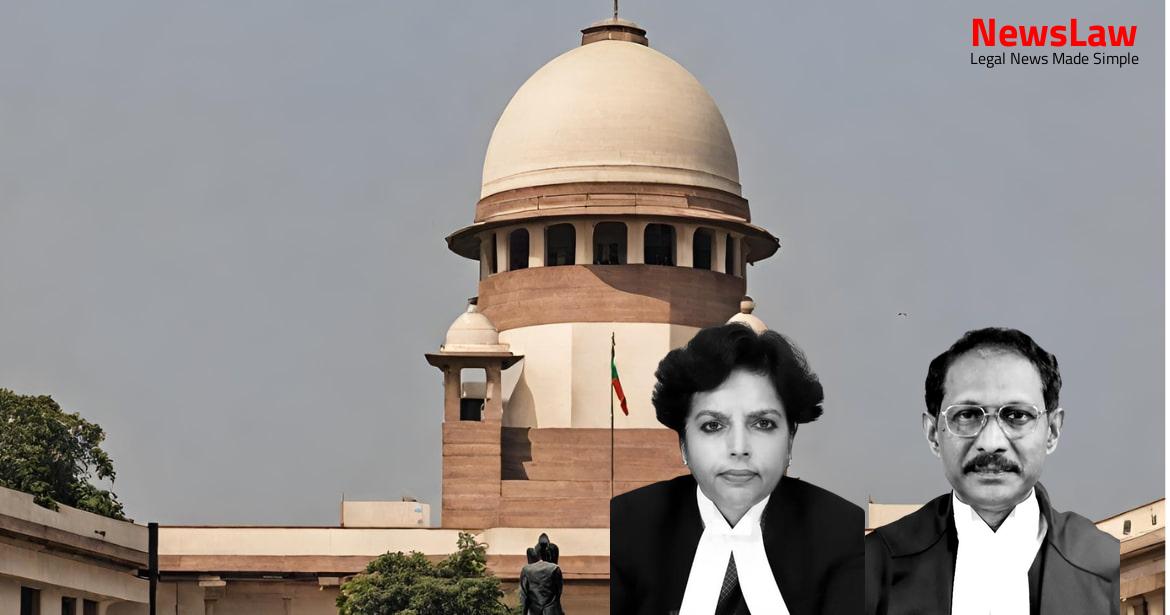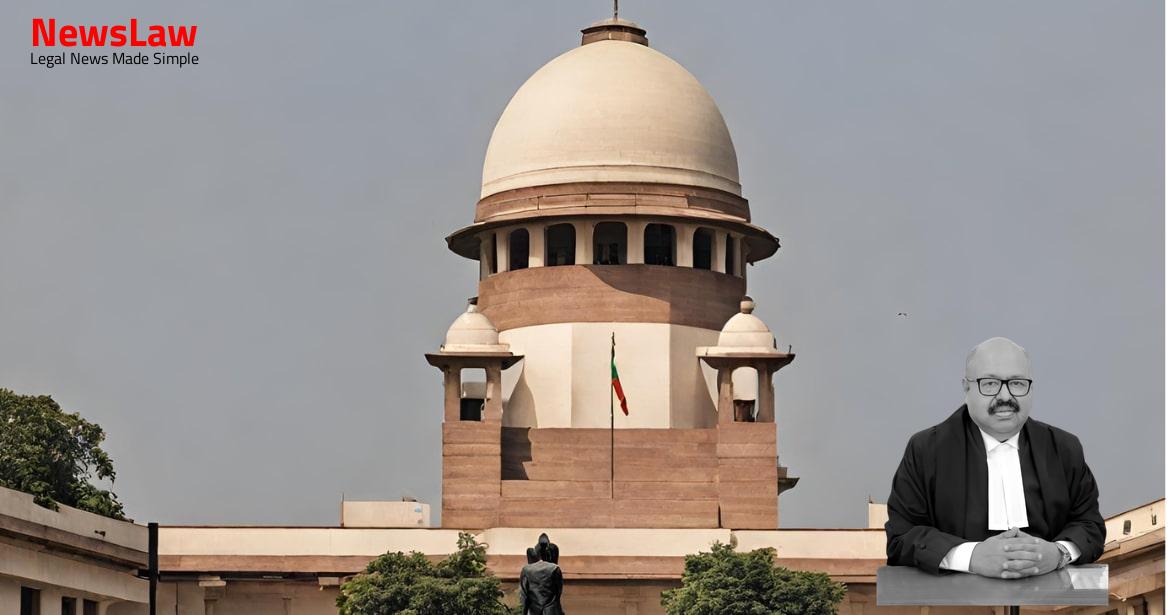The legal case discussed revolves around a complex land dispute involving the calculation of Transfer of Development Rights (TDR) at different Floor Space Index (FSI) percentages. The High Court’s rigorous legal analysis played a crucial role in determining the applicable TDR for the subject land, which was classified as ‘Hill Top/Hill Slope.’ The case delves into the interpretation of Development Control Rules and Development Plan, highlighting contrasting views between the appellants and respondents. Stay tuned to unravel the intricacies of this significant legal battle.
Facts
- The appellants challenged the rejection order before the Bombay High Court through a writ petition.
- Director, Town Planning, Pune requested the State Government to reconsider awarding TDR @ 100% FSI to the appellants.
- Principal Secretary, UD Department sought legal advice on this matter from the Advocate General.
- Appellants filed additional affidavits and documents in opposition before the High Court.
- Pune Municipal Corporation acquired the subject land and agreed to grant TDR to the appellants.
- High Court of Bombay dismissed the challenge by the appellants to reduce TDR from 100% FSI to 4% FSI.
- Appellants deposited a sum for construction of a compound wall on the subject land.
- Appellants filed a Special Leave Petition before the Supreme Court regarding the order.
- Multiple representations and submissions were made by the appellants to various authorities regarding the TDR issue.
- Chief Minister issued orders staying and later cancelling the TDR @ 100% FSI for the subject land.
- The rate at which TDR was to be granted for the subject land was a point of contention and clarification was sought.
- Advocate General’s opinion and legal advice played a key role in determining the applicable TDR for the subject land.
- Order dated 15 September, 2010 set aside Bombay High Court’s decision
- Matter remanded back for fresh consideration with liberty to file fresh affidavits and additional documents
- Order dated 11 December, 2008: High Court dismissed writ petition
- Subject land classified as ‘Hill Top/Hill Slope’
- Order dated 27 December, 2007 granted TDR @ 4% FSI instead of 100%
Also Read: Time as Essence of Contract in Sale Agreement: Legal Analysis
Arguments
- Appellants argue they are legally entitled to receive TDR at 100% FSI based on correspondence and opinions from government officials.
- They claim the respondents erred in cancelling the TDR originally granted, causing undue hardship and delay.
- Appellants argue against the High Court’s interpretation of their statement regarding the property being in a ‘Hill Top/Hill Slope’ zone, emphasizing the holistic view of their submissions.
- Respondents maintain the issue of ‘Hill Top/Hill Slope’ zone is under review and cite specific rules from the Development Control Rules and Development Plan.
- The appellants invoke the doctrine of promissory estoppel and legitimate expectation, asserting that the respondents are bound by their earlier assurance of TDR at 100% FSI.
- Counsel for the appellants references Town Planning Act provisions to argue for the return of the land and compensation if not retained by the Corporation.
- Contrasting views between the appellants and respondents on the classification of the subject land as per the Development Plan and DC Rules.
- Appellants surrendered land to Corporation in expectation of TDR compensation.
- Confusion arose regarding the rate of TDR to be granted for the surrendered land.
- Clarification was sought from Town Planning Department regarding TDR calculation.
- State sought opinion on TDR value from Advocate General.
- Concern raised that granting TDR @ 100% FSI may strain civic amenities in the city.
- Importance of regulating Development Plan in line with Town Planning principles highlighted.
- Core issue is whether surrendered land entitles to TDR @ 100% FSI or @ 4% FSI.
- Incorporation of zoning details of the subject land in the discussions for TDR calculation.
- Argument made that wrong information led to the opinion on TDR value.
- If granted 100% TDR, construction of 7,14,422 sq. feet area is anticipated.
- Significance of ‘permissible FSI of the zone’ in determining TDR calculation.
Also Read: Retirement Age of PTI/Sports Officer in University
Analysis
- The appellants were initially awarded TDR at 100% FSI, but later faced a reduction to 4% FSI due to the nature of their land being ‘Hill Top/Hill Slope’.
- The appeal was heard multiple times with directions for an amicable resolution, but the respondents failed to settle the matter.
- The appellants surrendered their land in 2004 in exchange for TDR, which has not been fulfilled to date.
- The authorities accepted and acted upon an opinion regarding TDR issuance, but did not seek a fresh opinion after discovering a factual error.
- The appellants have been left in limbo due to the back and forth between the State and Corporation respondents.
- Gross injustice has been done to the appellants who offered their land for public purpose based on a TDR scheme.
- Trouble arose when the granted TDR was cancelled, and FSI was reduced citing lack of residential development in adjoining areas.
- The issue of awarding FSI credit in Pune, unlike Mumbai, where public purpose sites are clearly demarcated, needs proper resolution.
- The matter has been lingering in courts for over eighteen years with several rounds of litigation.
- The subject land has remained in the possession of respondent No.3/Corporation, depriving the appellants of its use and entitled compensation since 2004.
- The impugned judgment is disagreed with based on the mentioned factual matrix.
Decision
- The TDR granted to the appellants is not being restored due to concerns about excessive construction in Pune
- Respondent Nos. 3 and 4/Corporation are directed to return the land acquired to the appellants within four weeks
- Appellants can use the land for residential purposes once possession is restored
- Impugned judgement is quashed and the appeal is allowed with the specified terms
- All proceedings must be completed within three months from the date of the order
- Respondents are instructed to compensate the appellants at Rs. 1 crore per year for the loss of surrendering land in 2004
Case Title: RAJHAN NARENDRA RAUT Vs. THE STATE OF MAHARASHTRA URBAN DEVELOPMENT DEPARTMENT . THROUGH SECRETARY (2022 INSC 863)
Case Number: C.A. No.-004639-004639 / 2012



